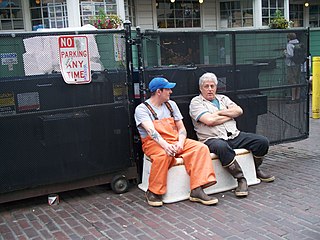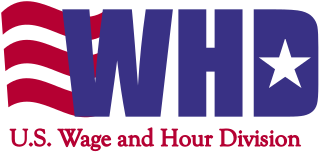
The Labor Management Relations Act of 1947, better known as the Taft–Hartley Act, is a United States federal law that restricts the activities and power of labor unions. It was enacted by the 80th United States Congress over the veto of President Harry S. Truman, becoming law on June 23, 1947.
Overtime is the amount of time someone works beyond normal working hours. The term is also used for the pay received for this time. Normal hours may be determined in several ways:

The rights and duties for employees, labor unions, and employers are set by labor law in the United States. Labor law's basic aim is to remedy the "inequality of bargaining power" between employees and employers, especially employers "organized in the corporate or other forms of ownership association". Over the 20th century, federal law created minimum social and economic rights, and encouraged state laws to go beyond the minimum to favor employees. The Fair Labor Standards Act of 1938 requires a federal minimum wage, currently $7.25 but higher in 29 states and D.C., and discourages working weeks over 40 hours through time-and-a-half overtime pay. There are no federal laws, and few state laws, requiring paid holidays or paid family leave. The Family and Medical Leave Act of 1993 creates a limited right to 12 weeks of unpaid leave in larger employers. There is no automatic right to an occupational pension beyond federally guaranteed Social Security, but the Employee Retirement Income Security Act of 1974 requires standards of prudent management and good governance if employers agree to provide pensions, health plans or other benefits. The Occupational Safety and Health Act of 1970 requires employees have a safe system of work.
Permatemp is a U.S. term for a temporary employee who works for an extended period for a single staffing client. The word is a portmanteau of the words permanent and temporary.
National League of Cities v. Usery, 426 U.S. 833 (1976), was a case in which the Supreme Court of the United States held that the Fair Labor Standards Act could not constitutionally be applied to state governments. The decision was overruled by the U.S. Supreme Court in Garcia v. San Antonio Metropolitan Transit Authority.
Anderson v. Mt. Clemens Pottery Co., 328 U.S. 680 (1946), is a decision by the US Supreme Court that held that preliminary work activities, if controlled by the employer and performed entirely for the employer's benefit, are properly included as working time under Fair Labor Standards Act. The decision is known as the "portal to portal case."

A break at work is a period of time during a shift in which an employee is allowed to take time off from their job. It is a type of downtime. There are different types of breaks, and depending on the length and the employer's policies, the break may or may not be paid.
Employee monitoring is the surveillance of workers' activity. Organizations engage in employee monitoring for different reasons such as to track performance, to avoid legal liability, to protect trade secrets, and to address other security concerns. This practice may impact employee satisfaction due to its impact on the employee's privacy. Among organizations, the extent and methods of employee monitoring differ.

The Fair Labor Standards Act of 1938 29 U.S.C. § 203 (FLSA) is a United States labor law that creates the right to a minimum wage, and "time-and-a-half" overtime pay when people work over forty hours a week. It also prohibits employment of minors in "oppressive child labor". It applies to employees engaged in interstate commerce or employed by an enterprise engaged in commerce or in the production of goods for commerce, unless the employer can claim an exemption from coverage. The Act was enacted by the 75th Congress and signed into law by President Franklin D. Roosevelt in 1938.
Garcia v. San Antonio Metropolitan Transit Authority, 469 U.S. 528 (1985), is a landmark United States Supreme Court decision in which the Court held that the Congress has the power under the Commerce Clause of the Constitution to extend the Fair Labor Standards Act, which requires that employers provide minimum wage and overtime pay to their employees, to state and local governments. In this case, the Court overruled its previous decision in National League of Cities v. Usery, in which the Court had held that regulation of the activities of state and local governments "in areas of traditional governmental functions" would violate the Tenth Amendment to the United States Constitution.
Skidmore v. Swift & Co., 323 U.S. 134 (1944), is a United States Supreme Court decision holding that an administrative agency's interpretative rules deserve deference according to their persuasiveness. The court adopted a case-by-case test, which considers the rulings, interpretations, and opinions of the administrator. The Supreme Court reversed and remanded the case for further proceedings.
Christensen v. Harris County, 529 U.S. 576 (2000), is a Supreme Court of the United States case holding that a county's policy of requiring employees to schedule time off to avoid accruing time off was not prohibited by the Fair Labor Standards Act.

The Wage and Hour Division (WHD) of the United States Department of Labor is the federal office responsible for enforcing federal labor laws. The Division was formed with the enactment of the Fair Labor Standards Act of 1938. The Wage and Hour mission is to promote and achieve compliance with labor standards to protect and enhance the welfare of the Nation's workforce. WHD protects over 144 million workers in more than 9.8 million establishments throughout the United States and its territories. The Wage and Hour Division enforces over 13 laws, most notably the Fair Labor Standards Act and the Family Medical Leave Act. In FY18, WHD recovered $304,000,000 in back wages for over 240,000 workers and followed up FY19, with a record-breaking $322,000,000 for over 300,000 workers.
IBP, Inc. v. Alvarez, 546 U.S. 21 (2005), is a US labor law case of the a United States Supreme Court, interpreting the Federal Labor Standards Act (FLSA) of 1938, as amended by the Portal-to-Portal Act of 1947.
Price Waterhouse v. Hopkins, 490 U.S. 228 (1989), was a landmark decision of the US Supreme Court on the issues of prescriptive sex discrimination and employer liability for sex discrimination. The employee, Ann Hopkins, sued her former employer, the accounting firm Price Waterhouse. She argued that the firm denied her partnership because she did not fit the partners' idea of what a female employee should look and act like. The employer failed to prove that it would have denied her partnership anyway, and the Court held that constituted sex discrimination under Title VII of the Civil Rights Act of 1964.

Blakey v. Continental Airlines, 992 F.Supp. 731 and 164 N.J. 38 (2000), is a case concerning whether an employer must be held liable for harassment that can potentially occur on an internal internet bulletin board. The plaintiff brought action under the federal district court for claiming a hostile work environment sexual harassment under Title VII of Civil Rights Act of 1964 and New Jersey Law Against Discrimination (LAD). Concurrently, the plaintiff brought action under the New Jersey state court alleging that employer was liable for hostile work environment arising from allegedly defamatory statements. While the case began as a sexual harassment lawsuit, the unusual circumstances involving the piloting forum where much of the harassment took place forced the courts to explore important questions concerning liabilities for content posted in a decentralized, electronic manner as is frequently the case on the internet.

Wage theft is the failing to pay wages or provide employee benefits owed to an employee by contract or law. It can be conducted by employers in various ways, among them failing to pay overtime; violating minimum-wage laws; the misclassification of employees as independent contractors; illegal deductions in pay; forcing employees to work "off the clock", not paying annual leave or holiday entitlements, or simply not paying an employee at all.
Genesis HealthCare Corp. v. Symczyk, 569 U.S. 66 (2013), was a decision by the United States Supreme Court dealing with the justiciability doctrine of mootness.
Harris v. Quinn, 573 U.S. 616 (2014), is a US labor law case of the United States Supreme Court regarding provisions of Illinois state law that allowed a union security agreement. Since the Taft-Hartley Act of 1947 prohibited the closed shop, states could still choose whether to allow unions to collect fees from non-union members since the collective agreements with the employer would still benefit non-union members. The Court decided 5–4 that Illinois's Public Labor Relations Act, which permitted the union security agreements, violated the First Amendment. A similar case was decided by the Court in 2018, Janus v AFSCME, overturning the Court's unanimous decision in Abood v. Detroit Board of Education (1977) which the appeals court had upheld in Harris.
Tyson Foods, Inc. v. Bouaphakeo, 577 U.S. ___ (2016), was a United States Supreme Court case in which the Court affirmed the decision of the United States Court of Appeals for the Eighth Circuit, which held that representative evidence could be used to support the claims of the class. The case arose as a class action lawsuit against Tyson Foods. The Supreme Court affirmed the Eighth Circuit's judgment that the class satisfied the predominance requirement of the Federal Rules of Civil Procedure's Rule 23 and that the use of representative evidence was allowable in this case. It has been cited by lower courts and has spawned significant academic discussion.






